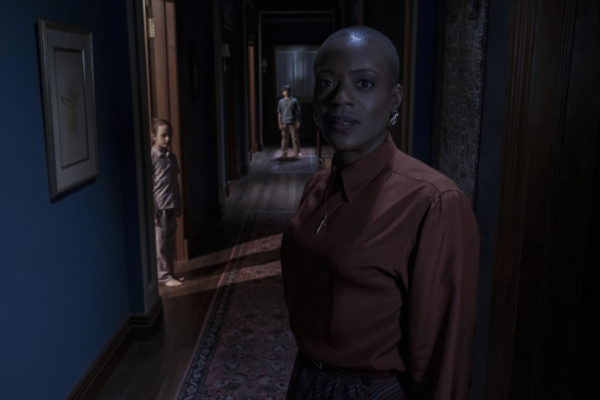
“This isn’t a ghost story. It’s a love story.”
The following review captures episodes 5-9 of The Haunting of Bly Manor. Click here for the review of episodes 1-4.
Spoilers follow…
This is a paraphrased line that adult Flora tells “The Narrator” (Carla Gugino) near the end of The Haunting of Bly Manor and there are no truer words spoken in the entire series (with the possible exception of “enough” from episode 8).
Possibly the biggest surprise of Mike Flanagan’s second spooky Netflix series is that it’s not really about the dozens of ghosts caught in the “gravity” of the Manor’s heartbroken original mistress, Viola Lloyd (Kate Siegel) at all. It’s actually about the doomed love affair between the American au pair, Dani (Victoria Pedretti) and the stand-offish gardener Jamie (Amelia Eve) and the sacrifices the women made to secure the safety of their charges and break a long standing curse. Considering all of the gothic horror overtones, this seems a fitting end – filled with waterlogged Victorian women in nightgowns, bodies hidden down wells and duplicitous sibling rivalries over money and power.
And yet, it’s also incredibly emotional and deeply resonant to see nearly the entire finale dedicated to Dani and Jamie’s attempt to leave behind the trauma of Bly Manor and make a life for themselves under the shadow of Viola’s impending resurrection (cleverly represented by Dani’s new eye colour). The series is a great showcase for both actresses, particularly Eve, who really gets to shine in the back half of the series. Credit also to Gugino’s dulcet tones (dodgy accent aside) as she brings the story to its bittersweet, inevitable close for the audience at the wedding.
It’s hardly surprising to discover the identity of these contemporary wedding goers, but there’s a melancholy air to the series’ closing moments when you realize that Jamie never recovered or moved on from Dani’s death by suicide. I’m sure Flanagan intended for audiences to take solace in the fleeting hand Dani lays on her wife’s shoulder in the closing shot, but it’s hard to discount that this is yet another story – however beautiful – about a queer couple who don’t get a happy ending.
I won’t lie: I read anger in Dani and Jamie’s reactions to Owen (Rahul Kohli)’s claim that it’s for the best that Flora (Amelie Bea Smith) and Miles (Benjamin Evan Ainsworth) have forgotten all about the events chronicled in these nine episodes. The two lesbians gave up everything for the Wingrave family and while they found each other, they wind up paying the price while Flora gets to prattle on about being sublimely happy with her dumb new husband.
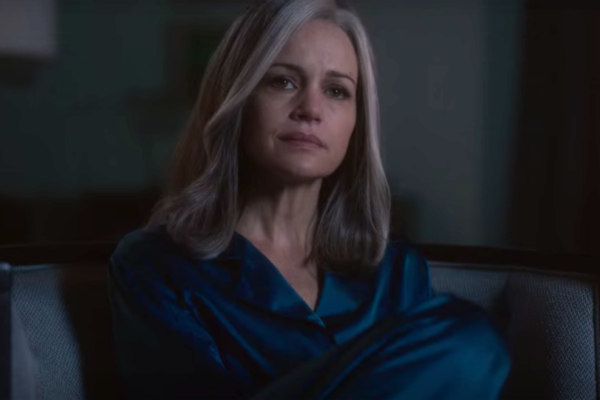
Don’t get me wrong: I don’t dislike the ending, though. Flanagan very clearly prioritizes the queer couple, especially for this final episode.
Perhaps I’m just in a slightly numbed state about watching back-to-back doomed queer romances between this and that stand-out 5th episode of Monsterland, which is similarly satisfying and incredibly difficult to watch. I applaud both texts for dedicating the time and energy to make audiences invest in the romances, but gosh is it ever exhausting to never see a queer couple come out with a win.
But I’ve done my own share of prattling now and there’s so much more to discuss than just the last episode! Terry, what were the other stand-out moments or episodes of the back half for you? Can we recognize the beauty and brilliance of T’Nia Miller as Hannah Grose, who was the major discovery of the series for me? And how nice was it to see Alex Essoe finally get more than a line or two in a Flanagan joint?
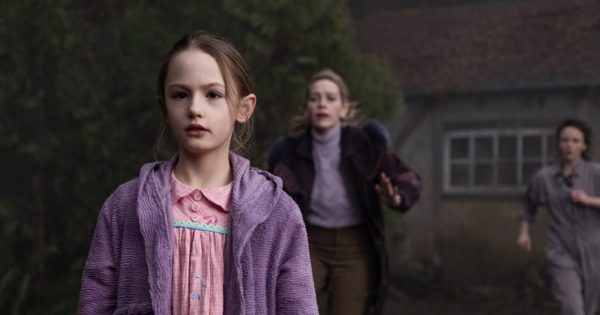
TERRY
I completely agree with a lot of what you’ve said, Joe. I also felt incredibly dumb when it was revealed that The Storyteller was actually Jamie, when I had initially suggested I thought it was Dani. Of course I shouldn’t have thought it was Dani because of the accent! It hit home in a scene in the final episode as Jamie finds Dani, packing in her room to leave the manor. Jamie tilts her head and gives Dani a look that immediately brought to mind Carla’s performance and I realized how silly I’d been.
The back half of The Haunting of Bly Manor is incredibly dense: filled with episodes that began to explain what was really going on, while keeping the focus squarely on love. Most of it worked brilliantly for me, starting with the powerhouse that was Episode 5 where we finally understand why Hannah Grose is as befuddled and resistant to consuming food as she is. What I loved the most about the episode was how it’s structured like a typical flashback, a device used previously in The Haunting of Hill House, but then we learn that these flashbacks are actually memories, as the ghosts of Bly Manor “tuck” each other or themselves away.
So when Miles is seen earlier in the season staring at the window, completely oblivious to the world and we see a “flashback” to his time at boarding school, it’s actually a memory that Peter Quint (Oliver Jackson-Cohen) “tucked” him away in. Similarly, it adds new meaning and painful resonance to the way Hannah has acted in the previous four episodes. In this way, Episode 5 hit really hard, particularly when we realize she keeps going back to the first time she met Owen and the romantic sparks flew. Even thinking back to how the earnest and naive Owen dreams of getting away from Bly and going back to Paris with Hannah gets me a little misty-eyed. The juxtaposition of Owen’s mom passing away from dementia and his statement that “we can’t count on the past” and Hannah’s own struggle with keeping her memory intact becomes a subtle and painful metaphor for remembering the dead.
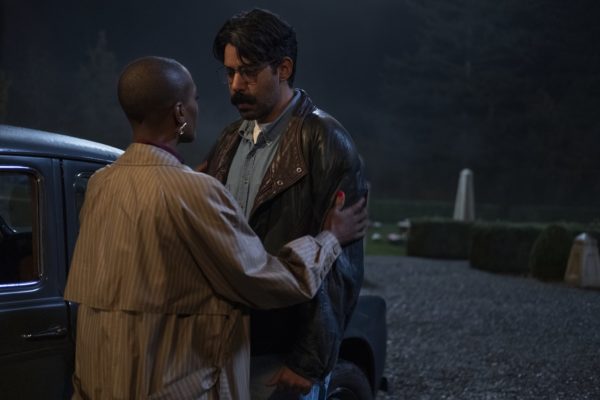
It’s explained through the back half of the season that over time the ghosts lose their faces and understanding of who they were, eventually becoming a thing that repeats the same actions over and over. And we know that this is the eventual fate for the wonderful Hannah Grose; to wander the halls of Bly, uncertain of what she’s supposed to do, while the outside world forgets about her. It’s through Owen’s actions and his intense love for Hannah that she will be remembered for at least as long as Owen is alive. It’s such a poignant metaphor for the way we keep those we’ve lost alive in our memories and T’Nia gives us the most emotionally powerful performance. She’s figuratively the heart of Bly Manor and I hope the world sees the actress’ talent so we see more of her. I honestly feel that she was the best part of this season, to the point where in some ways I think she’s the main character.
Before The Haunting of Bly Manor started, Mike Flanagan noted that this was based on “the works” of Henry James. This comes to light in the back half as we see the series tackle two additional short stories, “The Romance of Certain Old Clothes” and “The Jolly Corner.” The former becomes an explanation for the beginning of the haunting in Episode 8 and while the sisters are flipped and there’s some miscellaneous changes, it’s still a very faithful adaptation of the central conflict in that short story of two sisters fighting over the love of a man. “The Jolly Corner,” meanwhile, I found to be implemented in a rather dull way as it was used to examine Henry Wingrave (Henry Thomas) and his grief over losing his brother and sister-in-law/lover.
Both stories are important, particularly as it directly relates to the original story that set off the chain of ghostly reactions (both are also about two family members in love with the same person). Mostly, the Henry-centric sixth episode takes the conceit of a business man discovering his alter ego, a ghost of the man he might have been, who then torments him. But, for me, it didn’t work as well as the rest of the season because it establishes a ghostly presence outside of Bly Manor and detracts from the horrors of the manor (I also just didn’t really care for the character). Henry is the character we know the least about and this episode didn’t really add too much to the narrative for me, outside of a reason for calling the house and adding additional layers to the dark, doomed romance. I guess it did give us a chance to see Alex Essoe as Charlotte, Flora and Miles’ deceased mother, and she’s always a breath of fresh air.
Did you recoil at some of the nasty implications when Episode 7 explained Peter’s endgame with poor Miles and Flora? For as weak as I thought the kids acting was earlier in the season, this scene really showcased their range, I thought, and I’m curious if you reacted as strongly as I did. What about the revelations about Peter’s past and the memory of his mother telling him, “Honey, I don’t even know that you’re dead.”? I also touched on the episode above, but I’m curious what you thought about the black-and-white episode that finally gave us the backstory of Bly Manor and told the story of Viola (Siegel) and her sister Perdita (Katie Parker)?
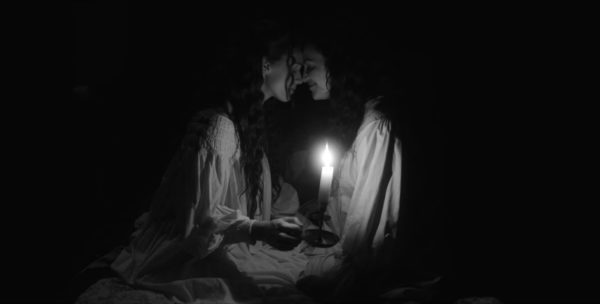
JOE
Whew boy! So much to unpack!
I’ll confess that if there’s one question that I still don’t completely understand, it’s what *exactly* Peter’s plan with the children involves. There’s evidence in his earlier episode with Rebecca that she can’t leave the grounds when he’s taken control of her body, so is the idea that by “tucking” away Miles and Flora away completely, they’ll be able to escape? The lack of clarity robbed that particular development of some of its power, though I was constantly surprised by how polarizing my reactions were to Peter over the course of the season.
It would have been easy to use Peter’s personal hell – that repeated memory with his mother – as an opportunity to engender sympathy for the man. Hell, even the fact that he didn’t actually abscond with the 200, 000 pounds, but was killed by Viola does that! And yet he’s so hissably capable of his own terrible actions, like the reveal of how he killed Rebecca without her consent (and left her body at the last minute so she would be the one to experience the drowning!) and, of course, his plan for the children. What a complicated, awful character, played so charmingly by Jackson-Cohen as the 2020 poster boy for domestic abuse.
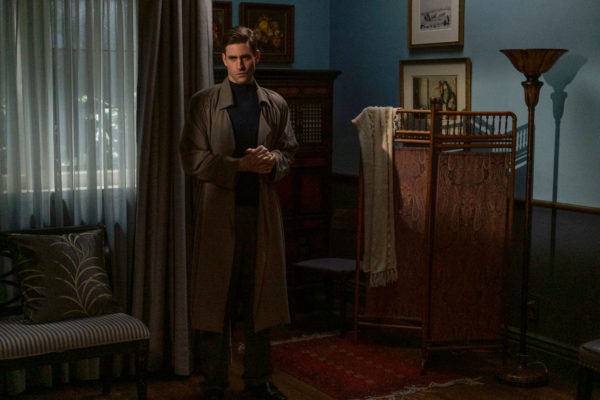
You’re right, Terry, that the kids are remarkably more tolerable as the series progresses. As I mentioned in our review of the first half, it’s that initial adjustment period at the start of the series that really threw me for a loop. It didn’t hurt that the children were used more judiciously in the back half. I will concede that Flora’s struggles with being tucked away in episode six, in addition to Jamie’s extended monologue about her own abusive back story, definitely made the Henry storyline go down a little easier. No shade to Thomas, who is fine in the role, but I’m 100% in agreement with you that there’s simply not enough new there to merit that much screen time to so little new info (it’s also the longest episode of the season, which…why?)
I will be very interested to see the public reaction to episode 8, which I was completely enamoured with. It’s a brazen creative decision by Flanagan to not only dispense with his entire regular cast to introduce a whole host of new characters, but also delay the resolution of episode 7’s cliffhanger, but I think it’s genius. I wrote you offline that this – and Hannah’s episode 5 – feel like the best contemporary examples of LOST’s storytelling structure, which was similarly unafraid of deviating from traditional linear, sequential storytelling to pack in necessary exposition and character backstory. I imagine that there will be some audiences who find the episode overlong and too repetitive (“She slept. She woke. She walked”) but that didn’t bother me at all. From the decision to shoot in black and white, to the creative visual depiction of Viola’s prison inside the trunk to the way she walked through Bly’s history, accruing victims, I was completely enthralled.
And really, that’s my key take-away from the series. A lot of folks going into this expecting another Hill House will be disappointed at the perceived lack of scares, particularly those audiences who felt “burned” by the ending of that series. If I thought Flanagan cared at all about that small backlash, you could argue that Bly Manor is his response: an entire series dedicated to his trademark fascination with blending emotionality and family drama into traditional horror tropes. In that sense, Bly Manor is the more consistent of his two Netflix series because it is never anything other than what it presents at the offset. Its rewatchability may be a little hampered as a result, but for people looking for a horror series that hits you right in the feels, this is the show for you. Series grade: A-
Terry, what are your thoughts on that unconventional eighth episode? Were you satisfied with the way the ghosts were ultimately released? And what are your final impressions of Bly Manor and your rating for the series?
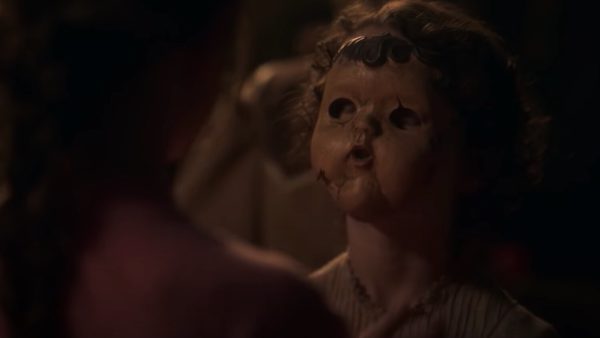
TERRY
Episode 8 was such a bold choice, Joe. It’s directed to perfection by Axelle Carolyn and it works so well both as an adaptation of another Henry James story but it also didn’t feel shoehorned into the plot. It has the chance of being a polarizing episode, as you suggested, because it does delay the cliffhanger satisfaction to focus on new characters. It’s daring and, as you mentioned, reminiscent of LOST’s narrative choices in the best way. You mentioned the repetitious refrain (“She slept. She woke. She walked.”) and what I appreciated the most about it was how the refrain continues throughout the history of Bly Manor. Ultimately, Bly Manor is about that repetitious trend and how it feeds into a cycle of trauma, violence and doomed love that goes all the way back to poor Viola.
The episode also has the one major jump scare of the series and while it’s nowhere near as effective as the car jump scare in Hill House’s eighth episode, it still got me. Speaking of the scares, though, that might be the singularly disappointing aspect of The Haunting of Bly Manor. Early on in the season, the series teases a series of ghostly figures in dark corners and under shadowy alcoves and standing behind people. Flora’s dollhouse and her dolls are directly tied to the spectral beings and their design is incredibly creepy, particularly the looming figure of the plague doctor. And while the eighth episode contextualizes the ghosts, it’s a shame they didn’t really figure further in the story. They’re too ominous and creepy to be barely used! It feels like a squandered opportunity.
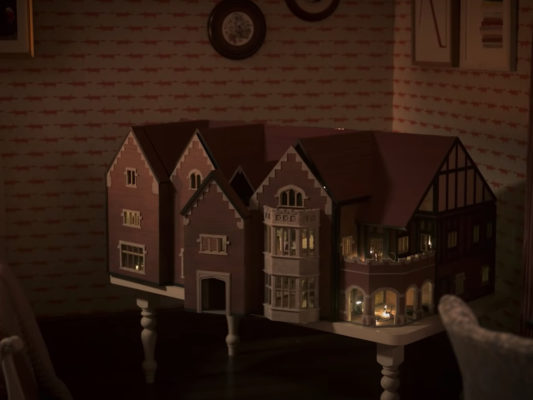
All that aside, I found The Haunting of Bly Manor to be such a fantastic example of gothic romance and horror. It’s beautifully constructed and gorgeously shot and good god if it didn’t punch me in the gut and reduce me to tears numerous times. I genuinely hope Flanagan and Co. continue their way through haunted house adaptations and they can keep up with turning out completely different stories. Looking at the season as a whole, I gotta give it a solid A for the way it completely disarmed and surprised me.